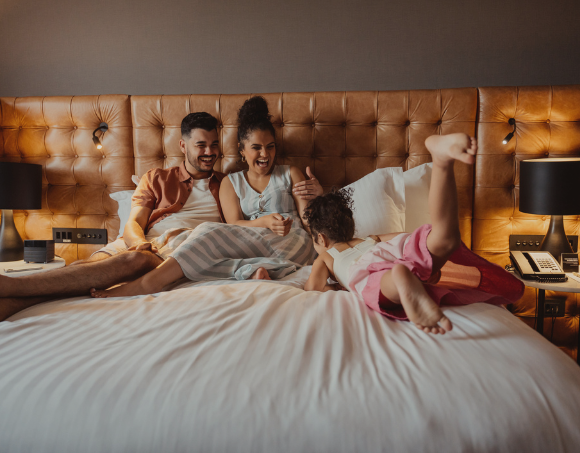What is CTV advertising and why does your hotel need it?
In the rapidly evolving landscape of hotel digital marketing, Connected TV (CTV) advertising has emerged as a powerful tool for hotels aiming to enhance their brand visibility and attract discerning travelers. By leveraging CTV ads, hotels can deliver personalized, engaging content directly to potential guests through internet-connected television devices–think about the ads you see while streaming Hulu or other ad-powered streaming platforms.
So - what are some of the benefits of using CTV ads for hotels, and how do you know if it’s right for your brand? Let’s get into it.
What is Connected TV (CTV) advertising for hotels?
To start with the basics, Connected TV simply refers to television sets that are connected to the internet, enabling viewers to stream content via applications on smart TVs, gaming consoles, or external devices like Roku, Amazon Fire TV, and Apple TV. Unlike traditional linear TV, where content is broadcast according to a set schedule, CTV allows users to access on-demand content at their convenience. This shift in viewing habits has opened new avenues for advertisers to reach audiences in a more targeted and interactive manner than ever before.
Benefits of CTV advertising for hotels
Running CTV ads programmatically will require the use of a Demand-Side Platform, or DSP for short. DSPs are software systems that allow advertisers to buy and manage automated digital ad inventory across multiple exchanges through real-time bidding. While there are many DSPs out there that specialize in CTV, we partner with Google Marketing Platform to run CTV ads through Display & Video 360. With this outlet, we are able to offer a variety of benefits for hoteliers when it comes to running CTV ads through the vast available inventory options.
1. Precise audience targeting
CTV advertising enables hotels to utilize advanced data analytics to target specific demographics, interests, and behaviors. This precision ensures that marketing messages reach potential guests who are most likely to be interested in the hotel's offerings, thereby increasing the efficiency of advertising spending. For instance, we can tailor your ads towards inventory more specific to your brand, whether it be on specific streaming channels or utilizing specific household incomes and buying behaviors. Hotels using specific travel-intent data through Adara or leveraging their comp set’s data with Azira will also enjoy additional targeting layers to hit even more precise and qualified audiences.
2. Enhanced engagement through visual storytelling
CTV advertising provides a dynamic platform for hotels to weave compelling narratives and showcase their unique offerings through captivating visuals that resonate with viewers on a visceral level. It’s important to note that your visual assets are designed with commercial aspects in mind; think professionally shot and edited. By immersing guests in a visual journey, hotels can evoke emotions, stir desires, and inspire travelers to explore more on their adventures.
3. Integration with your hotel’s digital marketing strategies
CTV advertising can be seamlessly integrated with your hotel's broader digital marketing efforts, creating a cohesive brand presence. For example, viewers who see a CTV hotel ad can be retargeted with related content through programmatic display banner ads, reinforcing the message and guiding potential guests through the booking funnel.
4. Access to premium TV content platforms
Recent CTV technology advancements have expanded opportunities for hotels to advertise on premium TV streaming content platforms. For instance, integrations with services like Netflix allow marketers to reach highly engaged audiences within a premium streaming environment. This access enhances the credibility and appeal of your hotel's advertising efforts.
What are the latest advancements in CTV advertising for hotels?
Recently, Google Marketing Platform (GMP) has introduced several innovations that enhance CTV advertising capabilities for hotels:
- CM360 + Netflix Ads integration: This integration streamlines ad serving and reporting, enabling marketers to reach Netflix's extensive subscriber base with contextual ads that align with viewer preferences.
- Cross-media reach reporting: Campaign Manager 360 now offers reports that provide a unified view of reach across digital video and linear TV campaigns. This feature helps us better understand audience overlap and optimize our media strategies accordingly.
- DV360 + Disney live sports and entertainment: Display & Video 360's certification with Disney allows for real-time bidding on live sports inventory, offering access to highly engaged audiences during major events.
Is Connected TV advertising right for your hotel?
While CTV is an incredibly beneficial tool for building brand engagement and awareness, it might not be right for all hotels. First and foremost, you must have the right creative assets. You’ll need professionally edited videos that are 15-30 seconds in length (think TV commercials). For many, this cost alone can be a barrier to entry.
Another thing to consider is the overall cost to run CTV advertising media. CTV ad types are much more expensive than regular display advertising, with CPMs averaging anywhere from $25-35. For this reason, GCommerce requires a $5K per month per campaign minimum to run CTV ads, but strongly recommends at least $10K per month to increase visibility and open the door to more targeting options and A/B test opportunities.
However, if your hotel has the opportunity to fund this initiative, the payoff is worth it. CTV is an ideal outlet for those looking to expand their brand into new markets and directly into the homes of prospective guests. It’s an incredibly powerful brand awareness tool and offers an easy entrance into a previously unattainable linear TV ad inventory type. On average, clients see a 98-99% video completion rate, with one current client seeing nearly 1 million users watch their video in full during a 90-day period.
Moving forward with CTV hotel ads
As the hospitality industry becomes increasingly competitive, hotels must adopt innovative marketing strategies to stand out. By leveraging the latest advancements in CTV technology and integrating these efforts with broader digital marketing initiatives, hotels can create compelling campaigns that resonate with modern travelers and drive bookings. Connect with the experts at GCommerce to get started today.


















